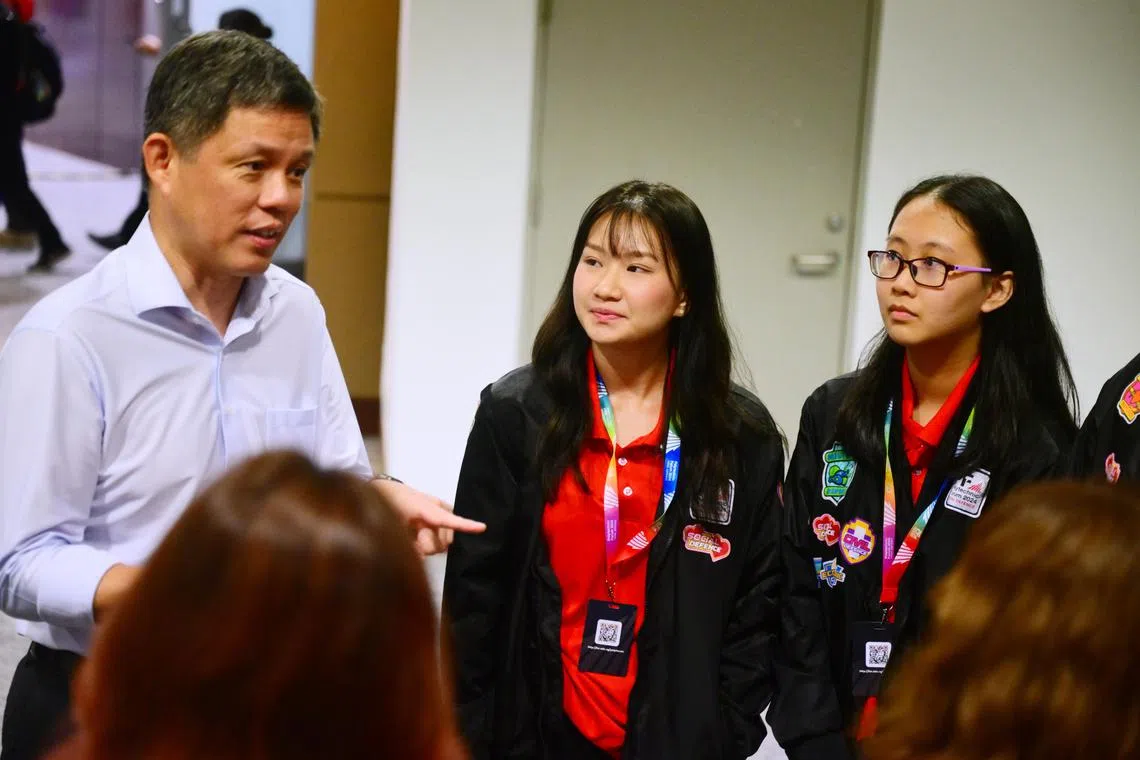Cohesion and capabilities are Singapore’s best defence against threats: Chan Chun Sing
Sign up now: Get ST's newsletters delivered to your inbox

Education Minister Chan Chun Sing with polytechnic students during a dialogue to mark 40 years of Total Defence on Sept 30.
ST PHOTO: AZMI ATHNI
SINGAPORE - Beyond physical attacks, the greatest threat to Singapore would be damage to its social fabric, said Education Minister Chan Chun Sing, because a divided society ends up being more vulnerable.
Singapore’s strongest defence lies in its cohesion and capabilities, he said, addressing polytechnic students during a dialogue on Sept 30 as part of events to mark 40 years of Total Defence.
“If you read the history of many countries that have fallen, chances are that the vast majority of them fell even before the first shot was fired,” Mr Chan said. “They fell because their countries were divided, and they started attacking each other on their own.”
Apart from internal cohesion, “real capabilities” are also needed to protect against potential disruptions, for example, in the running of the country’s transport system or in the security of computer networks, he said.
The dialogue was part of the Polytechnic Forum 2024, where Mr Chan posed a question to 500 polytechnic students on hypothetical ways to attack Singapore.
Students listed the disruption of supply chains, destroying of infrastructure and use of derogatory terms towards another race as examples of ways that Singapore could be attacked. In response, Mr Chan said that resilience and staying united are especially vital in a society.
“If we’re not cohesive, even the smallest attack, the smallest MRT incident, or a bomb going off, can tear us apart,” he said.
“Will you allow one bomb to destroy our whole nation? Will you allow one derogatory comment to destroy our whole social fabric?”
The six pillars of Total Defence all come back to maintaining cohesion and investing in capabilities, said Mr Chan, adding that all of them play a critical part in protecting Singapore.
Singapore’s concept of Total Defence was launched on Jan 22, 1984, as a national defence concept to rally Singaporeans in the event of a military threat and build up the people’s determination to stand up for Singapore. The concept’s original five pillars were Military Defence, Civil Defence, Economic Defence, Social Defence and Psychological Defence. Digital Defence was added in 2019.
“There will be difficulties, and there will be new difficulties every generation,” Mr Chan said. “But if we maintain our cohesion and continue to invest in our capabilities, no amount of challenges will break us.”
Organised by and held at Nanyang Polytechnic, the forum began on Sept 25 and will run till Oct 2, featuring hands-on activities, panel discussions, and learning journeys for students from all five polytechnics.

Mr Lionel Teo, Nanyang Polytechnic’s Diploma in Sport and Wellness Management course manager, moderating a fireside chat with Education Minister Chan Chun Sing at the Polytechnic Forum 2024 on Sept 30.
ST PHOTO: AZMI ATHNI
The Polytechnic Forum is an annual event for polytechnic students to discuss important issues. The topic in 2023 was Green Singapore, while students discussed in 2022 how to build a more caring and inclusive Singapore.
During the hour-long dialogue, students raised questions on topics ranging from geopolitical tensions and the recent Mobile Guardian hack to exam stress and worries about securing university placements and future employment.
Challenging students to redefine their ideas of success, Mr Chan said: “You might find yourself quite miserable most of the time, especially if everything about you is defined in relation to other people.”
Rather, success should be about collective contribution, he said, encouraging students to discover what makes each of them unique.
Third-year Nanyang Polytechnic pharmaceutical science student Lencia Wong said this point stood out for her the most.
“In Singapore, students are always focused on grades and trying to get the best results, but (Mr Chan said) what is important is what is special about us,” the 20-year-old said. “I think that was a very important reminder for me.”
She said she enjoyed the dialogue and discussions during the forum, which allowed her to have meaningful conversations on topics like Total Defence and mental resilience, and gain new insights. These were topics she had never thought about that deeply previously, she said.
Second-year Republic Polytechnic student Fion Ng said that while Total Defence was not a foreign topic to her, the question posed by Mr Chan prompted her to think deeper about digital defence as an information technology student.
Singapore is quite reliant on technology and the internet, which would make it more vulnerable if there were attacks on the cyber front, said the 18-year-old, adding that it was interesting to hear other students’ perspectives.
“The dialogue made me think about how it’s quite meaningful that the six pillars work together, and how when one pillar is affected, everything is impacted.”



